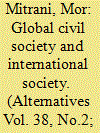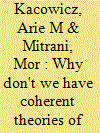| Srl | Item |
| 1 |
ID:
187722


|
|
|
|
|
| Summary/Abstract |
In recent years, political scientists increasingly have used data-science tools to research political processes, positions, and behaviors. Because both domestic and international politics are grounded in oral and written texts, computerized text analysis (CTA)—typically based on natural-language processing—has become one of the most notable applications of data-science tools in political research. This article explores the promises and perils of using CTA methods in political research and, specifically, the study of international relations. We highlight fundamental analytical and methodological gaps that hinder application and review processes. Whereas we acknowledge the significant contribution of CTA to political research, we identify a dual “engagement deficit” that may distance those without prior background in data science: (1) the tendency to prioritize methodological innovation over analytical and theoretical insights; and (2) the scholarly and political costs of requiring high proficiency levels and training to comprehend, assess, and use advanced research models.
|
|
|
|
|
|
|
|
|
|
|
|
|
|
|
|
| 2 |
ID:
121201


|
|
|
|
|
| Publication |
2013.
|
| Summary/Abstract |
The use of the concept of "global civil society" (GCS) acknowledges the intensifying role of non-state civic actors in world politics and expresses the emergence of a unique social sphere transcending national boundaries. Extensive literatures strive to suggest conceptualizations and assessments of the actual and desired effects of GCS. Nevertheless, relatively little attention has been given to the interplay between the emerging sphere of a GCS and the traditional sphere of international or interstate interactions. This article examines the idea of GCS through an exploration of the conceptual interplay between the notions of GCS and the interstate system. It presents a typology of three possible ideal-type relations: (1) GCS as replacement of statist features of the international system; (2) GCS as opposition to the state system; and (3) GCS as subsidiary organ to the international society. From a perspective informed by the English School of international relations theory, the article argues that the enhanced role of GCS in world politics is a result of international society's attempts to adapt interstate rules and practices to the context of globalization.
|
|
|
|
|
|
|
|
|
|
|
|
|
|
|
|
| 3 |
ID:
145065


|
|
|
|
|
| Summary/Abstract |
This article offers a systematic and critical attempt to consider the question of why the discipline of international relations is at something of a loss to deal with the concept of globalization at a theoretical level. The article discusses this theoretical deficit by raising the following questions: How should we cope with globalization from an IR perspective? Why don't we have coherent theories of IR about globalization? What should we do about that? We argue that although there is a theoretical need to theorize globalization in the framework of conventional IR theories, there are serious impediments that preclude us from developing coherent IR theories about globalization, mainly due to the inherent incompatibility between the features of conventional IR theories and the concept and realities of globalization.
|
|
|
|
|
|
|
|
|
|
|
|
|
|
|
|